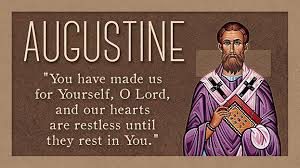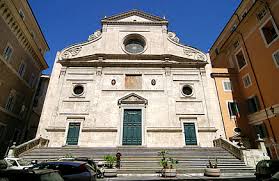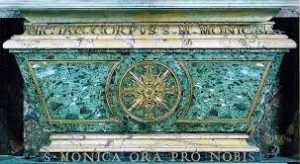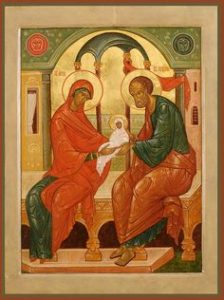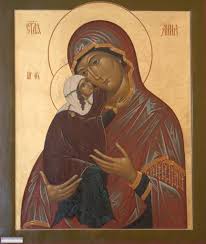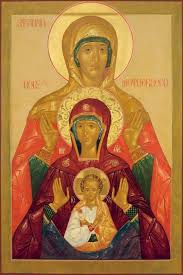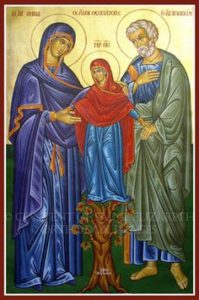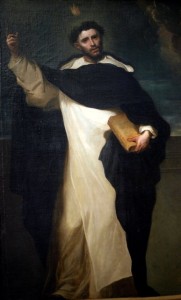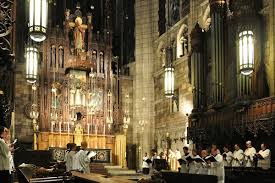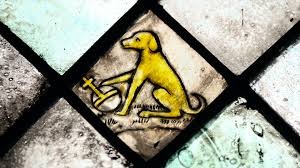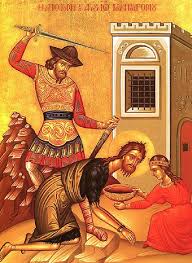 Today is the feast of the Beheading of John the Baptist.
Today is the feast of the Beheading of John the Baptist.
After the death of Jacques Hamel some denied he was a martyr (witness) because he was not given the opportunity to preserve his life by denying Christ. The Church has had different working definitions of those whom she honors as martyrs. The general definition today is a person who is killed out of hatred of Christ and His Church. But even wider definitions have been used.
Here is what the Venerable Bede says of John the Baptist:
“There is no doubt that blessed John suffered imprisonment and chains as a witness to our Redeemer, whose forerunner he was, and gave his life for him. His persecutor had demanded not that he should deny Christ, but only that he should keep silent about the truth. Nevertheless, he died for Christ. Does Christ not say: I am the truth? Therefore, because John shed his blood for the truth, he surely died for Christ.”
Similarly, until recently the Western Church had a feast of the Maccabees, Jews who died in testimony to the truth of the Mosaic Law.
Those who are persecuted because they testify to the truth of God’s law – that the poor should not be oppressed, that the unborn should not be killed, that the innocent should not be murdered – are indeed martyrs, whether or not the Church deems it possible or wise to honor them liturgically. The martyrs, known and unknown, will shine like the sun in the New Creation
saints
The Many Sides of St. Augustine
in Anglicans, Augustine, saints No Comments Tags: Anglicanism, Augustine, Love, Salvation, Sorrow, Time
Today is the feast of St. Augustine the greatest thinker of the Western Church. Over the years I have read much of his work.
Augustine and Limited Salvation
Two themes have always struck me. First of all, he always interprets Scripture to make salvation as narrow as possible. “God wills all men to be saved” is for Augustine a tautology: God wills all to be saved whom he wills to be saved, which is a small, very small portion of the human race: those who are members of the Catholic Church and remain in grace at the end of their lives. The rest of mankind is a “massa damnationis.”
On one hand this has given the Western Church a zeal for conversion, but this conversion has frequently used means that have tarnished the Gospel. On the other hand it has given the Western Church a narrow, dark character that ends in sectarianisms, Calvinism, Jansenism, and a hardness of heart, In discussions of the possibility of universal salvation, it is clear that many Christians would be sorely disappointed if everyone were saved. They take as their model the Elder Brother in the Parable of the Prodigal Son.
Augustine and Time
But what fascinates me most about Augustine is his thoughts on time. A few years ago the Scientific American devoted an entire issue to time; is it real? Illusory? What is it? Does is always move in only one direction? Or can it move in the other direction? If not, why not? The issue concluded that the most profound thought on the nature of time was Augustine’s, and he regarded time as a mystery.
Does the past exist? But everything we know is in the past. Even the sensations of our own body take time to reach our brains. Light from the planets takes minutes to reach us, from the stars years, from the galaxies millions or billions of years. They all could have ceased to exist a million years ago, and we would not know it. If the past does not exist, then we know nothing of the present.
Time and space a creatures of God. Are their properties absolute? Can they, will they, be changed? Open theology fails to see that time exists in God, not God in time.
Can God change the past? What would that mean? He has promised to make all things new. Does that include space and time? Can he, will he, change the past? What would be the meaning of the struggles and sorrows of creation?
Reading Augustine forces one to struggle with some of the profoundest themes of theology and philosophy. It is Cross Fitness Training for the mind.
Augustine and Anglicanism
Augustine is many-sided; and two of those sides may be of special interest to those who worship in the Anglican tradition.
Augustine was above all the Doctor of Love. He examined the human heart and saw that disordered love was the cause of our alienation from God. We do not love as we ought, and therefore our lives are not what they should be.
A moment’s refection should convince us that our loves are disordered. We desire food: but how many of us struggle to eat only what and how much we should; and a handful (anorexics) do not eat enough. Our sexual desires are disordered; we desire those whom we should not desire, or do not desire our spouses enough and in the right way or desire pleasure detached from personal communion in holy matrimony. Wealth, reputation, comfort, knowledge – all good things in themselves – we desire in the wrong way.
And so the priest prays:
Almighty God, unto whom all hearts be open, all desires known, and from whom no secretes are hid: cleanse the thoughts of our hearts by the inspiration of thy holy spirit, that we may perfectly love thee, and worthily magnify thy holy name.
What should we desire above all else? “Thou hast made us for thyself, and our hearts are restless until we rest in Thee.”
And what does God command us:
Hear what our Lord Jesus Christ saith.
THOU shalt love the Lord thy God with all thy heart, and with all thy soul, and with all thy mind. This is the first and great commandment. And the second is like unto it; Thou shalt love thy neighbor as thyself. On these two commandments hang all the Law and the Prophets.
So love is the center of God’s revelation.
Those who love are filled with unspeakable sorrow if they have injured the one they love. What must a parent feel, if he has even by accident killed his child!
And so our hearts are burdened by the thought that we have sought to injure the One who loves us, that indeed we have crucified Him.
ALMIGHTY God, Father of our Lord Jesus Christ, Maker of all things, Judge of all men; We acknowledge and bewail our manifold sins and wickedness, Which we, from time to time, most grievously have committed, By thought, word, and deed, Against thy Divine Majesty, Provoking most justly thy wrath and indignation against us. We do earnestly repent, And are heartily sorry for these our misdoings; The remembrance of them is grievous unto us; The burden of them is intolerable. Have mercy upon us, Have mercy upon us, most merciful Father; For thy Son our Lord Jesus Christ’s sake, Forgive us all that is past; And grant that we may ever hereafter Serve and please thee In newness of life.
Therefore to my ear the Anglican use has an Augustinian flavor or emphasis; such things are not absent from the Ordinary Form of the Roman Liturgy, but the Anglican Use makes them more prominent.
PS. Someone just posted this quote from Martin Thornton’s English Spirituality:
“Grace to Augustine is that love which lies at the heart of his spirituality; it is that which, by its very nature, confers independence on the object of its love. It gives, compelling no return, it is the one force that cannot bargain, it is the opposite of irresistible passion, for it liberates rather than enslaves, creates not destroy, strengthens rather than weakens free volition: in more familiar language, ‘the service of God is perfect freedom.’ What Augustine is insisting upon is the first principle of all sound theology, that God acts first in both creation and redemption, and that his love is the force behind both. We are called to respond to that love, but because of frailty response is difficult, because of concupiscence we are drawn to other, unworthy objects of love. Therefore we need discipline, especially the disciplines of prayer: ascetical theology is the technique of loving God.”
Monica and Worried Parents
in saints, Women in Church No Comments Tags: Augustone, gypsies, Monica, worried parents
Today is the feast of St. Monica, the patron of all parents who are worried about their children, that is, almost all parents.
The Catholic Herald summarizes the story:
St Monica was born in 331 and is believed to have been of Berber origin. She married a pagan known as Patricius who was prone to violence and annoyed by Monica’s charity and pious habits.
Monica bore three children; Navigius, Perpetua and Augustine. When Augustine fell ill, Monica was greatly distressed because Augustine, like the rest of her children, was not baptised. She begged her husband to allow her to baptise Augustine and he agreed but then withdrew consent once Augustine had recovered.
Following Augustine’s recovery, he became lazy and wayward and was eventually sent to a school in Madauras. He was 17 and studying rhetoric in the city of Carthage when his father died.
During his time at Carthage Augustine became a Manichaean, a follower of a religion founded by the Iranian prophet Mani. Monica was so upset that she sent Augustine away but relented when she experienced a vision, encouraging her to reconcile with him.
St Monica visited a bishop [St. Ambrose] to discuss her concerns about Augustine and he told her: “The child of those tears shall never perish.”
Monica followed Augustine to Rome but when she arrived discovered that he had gone to Milan. She persevered and followed her son to the city, where she met St Ambrose and to her joy discovered that Augustine had embraced Christianity after 17 years of resisting the faith.
Monica and Augustine spent six months in serenity at Rus Cassiciacum (now known as Cassago Brianza) and Augustine was then baptised in the church of St John the Baptist in Milan. When in 387 St Monica died, her son’s grief inspired him to write his famous book Confessions.
Augustine’s body was lost when the city of Hippo where he was bishop was overrun by the Vandals. However, Monica’s body is still preserved in the basilica of S. Agostino in Rome.
The Basilica of St. Augustine in Rome
Several years ago my wife and I were visiting the basilica to pray at her tomb for one of our children who was having a severe crisis. As we left, we encountered on the steps a begging gypsy woman holding a baby (probably borrowed). She knew quite well that any parent leaving the basilica would have a tender heart for children and would open his wallet, which I of course did. I rather liked the gypsy beggars in Rome; they were all dressed a gypsies should be, and I suspect were hired by the city government from central casting to give an authentic flavor to the city.
The Altar that contains the body of St. Monica
Someone has written a Litany of St. Monica:
St. Monica, pray for us and for our children.
Model of wives, pray for us and for our children.
You who converted your unbelieving husband, Mother of St. Augustine, pray for us and for our children.
Strict and prudent teacher, guardian of your son in all his ways, pray for us and for our children.
You who carefully watched over his conduct, pray for us and for our children.
You who were sorely distressed at his erring from the right, pray for us and for our children.
You who were untiring in your petitions for his soul’s safety, pray for us and for our children.
You who still hoped on amid the bitterness of your heart and your floods of tears, pray for us and for our children.
You who were filled with consolation upon his return to God, pray for us and for our children.
You who died calmly after faithfully fulfilling your duties, pray for us and for our children.
You who are the prayerful intercessor of all mothers who pray and weep as you did, pray for us and for our children.
Preserve the innocence of our children, we beseech you, St. Monica.
Protect them against the deceits of evil men, we beseech you, St. Monica.
Protect them from the dangers of bad example, we beseech you, St. Monica.
Watch over the movements of grace in their hearts.
Let the Christian virtues strike deep root in their hearts and bear much fruit.
Redouble your intercession for youth approaching manhood.
Obtain for all in mortal sin true contrition and perfect conversion.
Obtain for all mothers to fulfill their duties steadily and perseveringly.
Commend all mothers to the protection of the ever-blessed Virgin Mother of Our Lord.
Favorably incline the heart of your beloved son Augustine to the salvation of our children.
St. Augustine, holy son of a saintly mother, pray for us and for our children.
The Grandmother and Grandfather of God
in saints No Comments Tags: Ann, Joachim
The Feast of Anna and Joachim
July 26
Ann and Joachim were very early identified as Mary’s mother and father.
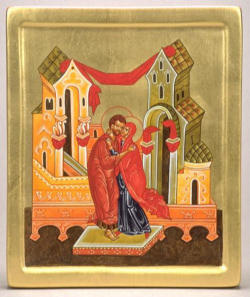
There is also a charming image of the kiss of Ann and Joachim at the Golden Gate.
Here are Joachim and Ann with the new-born Mary in swaddling clothes.
Another was modeled after the icon of The Mother of God Sweet-Kissing, Mary is shown tenderly embracing Ann.
Ann was frequently show holding Mary who was holding Jesus.
Here is the Holy Family of Joachim, Anna, and Mary, who is springing from the Root of Jesse.
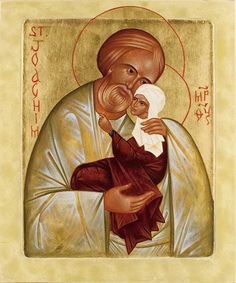
I like the image of Joachim holding his daughter; again, based on the icon of The Mother of God Sweet-Kissing.
Advice from Vincent Ferrer
in saints No Comments Tags: Vincent Ferrer
Today is the feast of the great Dominican preacher Vincent Ferrer (1357-1419). He gave advice to preachers; the core of the advice, which all Christians should follow, is that all that we say, even rebukes to sin, must be motivated by love.
In sermons and talks, use simple language and a homely conversational style to explain each particular point. As far as you can, give plenty of examples; then, whoever has committed that particular sin will have his conscience pricked, as though you were preaching to him alone. But it must be done in such a way that your words do not appear to come from a soul full of pride or scorn. Speak rather out of the depths of love and fatherly care, like a father suffering for his sinful children, as if they were gravely ill, or trapped in a deep pit, whom he is trying to draw out and set free, and look after like a mother. You must be like one who delights in their progress, and in the glory in heaven that they are hoping for.
Such a style usually has a good effect on a congregation. For, to speak of virtues and vices in general terms evokes little response from listeners.
Similarly in confession, whether you are gently comforting the timid, or more sternly putting the fear of God into the hardened sinner, you must always show the deepest love, so that the sinner always feels that your words come out of pure love. In this way, your words of sweetness and love will have a more penetrating effect.
But in your desire to be of use to the souls of your neighbours, you must first of all have recourse to God with your whole heart, and simply make this request of him. Ask him in his goodness to pour into you that love in which is the sum of all virtues, through which you may be able to achieve what you desire.
St. Vincent Ferrer Church, New York
The Dominicans were the Domini canes, the hounds of the Lord, protecting His flock from heretics.
